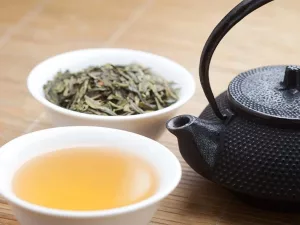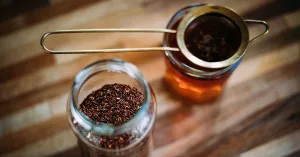Rose hips are the small fruits produced by rose bushes and are commonly used to prepare a soothing herbal infusion. This simple-to-make tea is packed with antioxidants, offers protective qualities, and may even help combat skin aging.

Rosehip tea is an infusion created from the pseudo-fruits of the rose bush.
It features a gentle floral note with a mildly sweet profile and a characteristic tart finish.
Sitting just beneath the rose petals, rose hips are small, round, and usually red or orange.
There are hundreds of rose species, but most research has concentrated on the pseudo-fruits of Rosa canina (1).
Rose hips have been associated with many advantages, including enhanced immunity, cardiovascular support, weight management, and slowing skin aging.
Below are 8 potential health advantages of sipping rosehip tea.
1. High in antioxidants
Antioxidants are compounds that help shield cells from damage caused by unstable molecules known as free radicals.
Eating and drinking antioxidant-rich foods may help lower the risk of chronic diseases such as heart disease, cancer, and type 2 diabetes (2).
In a comparison of antioxidant levels in six fruit extracts, rosehip ranked highest for antioxidant capacity (3).
Specifically, rose hips are rich in polyphenols, carotenoids, and vitamins C and E — all potent antioxidants (1, 4).
Levels of these antioxidants vary widely depending on species, harvest timing, and the altitude where the plant grew (4, 5).
Notably, plants cultivated at higher elevations often contain greater antioxidant concentrations (4).
Research also indicates that dried rose hips may retain fewer antioxidants than fresh ones (6).
Since rosehip tea can be brewed from either fresh or dried fruits, using fresh rose hips instead of dried tea bags may deliver more antioxidant benefit.
Summary Rose hips are loaded with antioxidants that help guard cells from free radical damage. Antioxidant content varies by plant and processing, with fresh rose hips typically retaining more than dried ones.
2. May support immune health
One standout attribute of rose hips is their very high vitamin C content.
Although amounts vary by plant, rose hips are among the fruits and vegetables highest in vitamin C (1, 4).
Vitamin C plays multiple vital roles in immunity, including (7, 8, 9, 10):
- encouraging the production of lymphocytes, white blood cells that defend against infection
- boosting lymphocyte function
- helping preserve the skin’s barrier against external pathogens
Besides vitamin C, rose hips supply polyphenols and vitamins A and E, which further support and protect immune function (11, 12, 13, 14).
Some animal trials indicate that concentrated rosehip extracts can enhance immune responses, but human data are limited (10).
Summary Rose hips contain exceptionally high vitamin C levels compared with many produce items. That vitamin, along with other compounds in rosehip tea, may help strengthen your immune defenses.
3. May benefit heart health
Thanks to its antioxidant profile, rosehip tea could be advantageous for cardiovascular health.
Research links vitamin C intake with heart disease risk factors.
A review of 13 studies reported that taking at least 500 mg of vitamin C daily was related to meaningful reductions in LDL (bad) cholesterol and triglycerides, which are risk factors for heart disease (15).
Observational studies have also associated low vitamin C intake with a higher risk of death from heart disease (16).
Rose hips are rich in flavonoids, antioxidants that have been shown to lower blood pressure in people with elevated values and enhance blood flow to the heart (17).
In a 6-week trial of 31 adults with obesity, participants who drank a beverage containing 40 grams of rosehip powder daily experienced significant improvements in blood pressure and LDL cholesterol compared with the control group (18).
However, researchers noted that the high fiber in the powder might have contributed to the benefits — fiber that would not be present in a standard rosehip infusion.
Summary Rose hips contain heart-protective antioxidants, but more research is necessary to determine how effective rosehip tea itself is for cardiovascular health.
4. May help with weight management
Some evidence suggests a link between rosehip consumption and reduced body weight.
Rose hips from Rosa canina are rich in tiliroside, an antioxidant thought to have fat-reducing effects.
In an 8-week mouse study, animals on a high-fat diet supplemented with 1% rosehip extract gained significantly less weight and abdominal fat than those not given the extract (19).
Human data show comparable outcomes. In a 12-week trial of 32 overweight adults, those taking 100 mg of rosehip extract daily lost significantly more weight and abdominal fat than the placebo group (20).
Still, current findings are mostly about concentrated rosehip extracts rather than tea. More human research is needed to assess whether drinking rosehip tea yields similar weight-related effects.
Summary Animal and limited human studies suggest rosehip extract may reduce body weight and belly fat. More trials specifically testing rosehip tea are required.
5. May offer protection against type 2 diabetes
Although mechanisms aren’t fully understood, some studies indicate rose hips might guard against type 2 diabetes.
In mice fed a high-fat diet, adding rosehip powder for 10–20 weeks significantly lowered blood glucose, reduced fasting insulin, and curtailed fat accumulation in the liver — all risk factors for type 2 diabetes (21).
Another animal study found rosehip extract significantly decreased fasting blood sugar in diabetic rats (22).
However, in a human trial of overweight adults, daily rosehip powder supplementation did not significantly change fasting glucose or insulin sensitivity — results that held for participants with normal and impaired glucose regulation (20).
As with weight loss research, most studies focus on extracts rather than tea, so additional research on rosehip tea and diabetes risk is warranted.
Summary Animal studies point to antidiabetic effects of rosehip extract, but human confirmation is lacking. More research specifically on rosehip tea is needed.
6. May lessen inflammation and ease pain
Rosehip tea contains anti-inflammatory constituents such as polyphenols and galactolipids (1, 23).
Galactolipids, fats commonly found in cell membranes, have recently been investigated for potent anti-inflammatory effects and the potential to reduce joint discomfort (1, 24).
A review of three trials found rosehip supplementation significantly decreased joint pain in people with osteoarthritis; those taking rosehip were about twice as likely to report pain relief versus placebo (24).
In a 4-month study of 100 osteoarthritis patients, daily supplementation with 5 grams of rosehip extract led to markedly less pain and better hip mobility than the control group (25).
Indeed, 65% of participants in the rosehip group reported some degree of pain reduction (25).
There is also preliminary suggestion that rosehip extract may help rheumatoid arthritis, though robust human trials are scarce (1).
Be aware that most anti-inflammatory research has used concentrated rosehip preparations rather than brewed tea.
Summary Rosehip tea is rich in anti-inflammatory molecules like galactolipids. Studies link rosehip extract to reduced arthritis pain, but further research is necessary to determine whether tea produces the same benefits.
7. May help prevent skin aging
Collagen, the body’s most abundant protein, gives skin its firmness and elasticity.
Vitamin C stimulates collagen formation and helps protect skin cells from UV damage, which contributes to a more youthful appearance. Because rosehip tea is high in vitamin C, it may benefit skin health (26).
Rosehip also contains carotenoids like astaxanthin, which may protect collagen from degradation and exhibit anti-aging properties (27, 28).
Other carotenoids present, including vitamin A and lycopene, can help shield skin cells from sun-induced damage (28).
In an 8-week trial of 34 people, those consuming 3 grams of rosehip powder daily experienced fewer crow’s-foot wrinkles and improvements in skin moisture and elasticity (27).
Still, it remains uncertain whether drinking rosehip tea would deliver identical skin benefits (27).
Summary Rosehip tea is abundant in compounds — such as vitamin C and carotenoids — linked to skin protection and anti-aging. While rosehip powder reduced certain wrinkles, more research is necessary to see if tea offers the same outcomes.
8. Simple to prepare at home
Rosehip tea has a tartness reminiscent of green apple and may be brewed from the pseudo-fruits of most rose varieties.
However, avoid using rose hips from shrubs treated with pesticides that are not labeled as safe for human consumption.
Rose hips resemble tiny red or orange apples and grow directly beneath rose petals.
To make tea with fresh hips, rinse them thoroughly to remove dirt and debris.
Then place 4–8 rose hips in a cup (240 ml) of boiling water. Allow the infusion to steep for 10–15 minutes, then remove the fruits.
Dried rose hips work as well — you can dry fresh rose hips yourself or purchase pre-dried loose-leaf rosehip tea.
For dried hips, put 1–2 teaspoons in an infuser and submerge in a cup (240 ml) of boiling water. Steep for 10–15 minutes and remove the infuser.
If the flavor is too tart, add a sweetener such as honey to mellow it.
Rosehip tea is enjoyable both hot and iced.
Summary Rosehip tea is easy to brew from fresh or dried hips. Adding honey can help offset the tartness.
Precautions
For most healthy adults, rosehip tea hasn’t been associated with severe adverse effects. Still, certain people should avoid it.
The safety of rosehip tea during pregnancy and breastfeeding hasn’t been well studied. If you are pregnant or nursing, speak with your healthcare provider before consuming this tea.
Because rosehip tea is high in vitamin C, it may raise the risk of kidney stone formation in susceptible individuals (29).
Also, if you take lithium for psychiatric conditions, avoid rosehip tea: its diuretic properties could increase lithium concentration in the body and lead to serious side effects (30).
Summary Rosehip tea is generally safe for adults, but evidence on its safety during pregnancy and breastfeeding is limited. It may increase kidney stone risk and interfere with lithium therapy in some people.
The bottom line
Rosehip tea is an herbal infusion made from rose pseudo-fruits with a subtle floral note and a notable tartness.
Easy to prepare at home, it may offer several potential benefits.
Thanks to its antioxidant content, rosehip tea might support immune health, aid weight management, relieve joint pain, promote healthier-looking skin, and contribute to heart and metabolic health.
However, many positive findings come from studies of concentrated rosehip extracts, so it’s unclear how much tea you’d need to drink to achieve those effects.
Still, whether bought dried or brewed from fresh hips, this flavorful beverage can add a zesty, nutritious option to your routine — and it pairs well with other skin- and hair-supporting approaches like rosehip oil for hair.

























Leave a Reply
You must be logged in to post a comment.